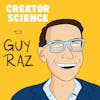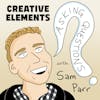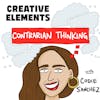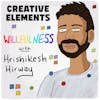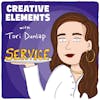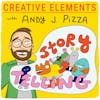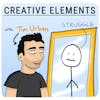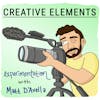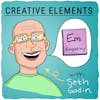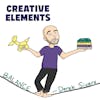
#120: Derek Sivers – How to Live as a Creator and Why You Should Focus Like a Monomaniac
Play EpisodeDerek Sivers is a musician, producer, circus performer, entrepreneur, TED speaker, and book publisher. He's written four books including How To Live, Hell Yeah Or No, Your Music And People, and Anything You Want.
WATCH
▶️ Watch this episode on YouTube
***
EPISODE DESCRIPTION
Derek Sivers is a musician, producer, circus performer, entrepreneur, TED speaker, and book publisher. He's written four books including How To Live, Hell Yeah Or No, Your Music And People, and Anything You Want.
He's also the founder of CD Baby – the largest seller of independent music online, with $100 million in sales for 150,000 musicians. In 2007, Derek sold that business for $22 million – almost all of which Derek donated to a charitable trust for music education.
In this episode, we talk about how Derek keeps himself focused on ONE project at a time, how to navigate conflicting philosophies, what we can learn from professional musicians, and how creators can pursue balance in our lives.
Full transcript and show notes
See Derek Sivers book recommendations
Follow Derek Sivers on Twitter / YouTube
TIMESTAMPS
00:00 - Who is Derek Sivers?
00:27 - Derek is a Monomaniac
01:19 - Derek’s Inspiration for “How To Live”
01:58 - What We Learn Today
02:45 - Derek Has a Singular Focus
04:14 - Is Being a Monomaniac Innate or Learned?
04:57- Don’t Be a Donkey! (Buridan’s Donkey Paradox)
06:54 - Why It’s Important to Prioritize and Sequence in Your Life
07:46 - How to Use Journaling to Prioritize Your Life
09:19 - Life is NOT a Problem to be Solved
12:33 - How Do You Decide What Gets Priority?
17:10 - How to Navigate Conflicting Philosophies
20:10 - Derek’s Process of writing “How To Live”
21:30 - Your Values Change Over Time
23:13 - Breaking Away From Tribalism
24:21 - How to find Balance in Your life
27:49 - STOP Relying on Your Job to Fulfill EVERY Need
30:23 - Derek’s Life as a Musician
31:34 - Momentum is SO Important
34:39 - What Creators Can Learn From Musicians
35:57 - The History of Starbucks (And What You Can Learn From It)
38:22 - Intrinsic VS Extrinsic Motivation
43:10 - Even Rock Stars Have a Boss
44:54 - What Will Derek Do Next?
***
CONNECT
🙏 Make a guest or mailbag request
📝 Check out our curated Playlists
***
SPONSORS
💼 View all sponsors and offers
***
SAY THANKS
💜 Leave a review on Apple Podcasts
***
PODGLOMERATE NETWORK
This show is a part of the Podglomerate network, a company that produces, distributes, and monetizes podcasts. We encourage you to visit the website and sign up for our newsletter for more information about our shows, launches, and events. For more information on how The Podglomerate treats data, please see our Privacy Policy.
Since you're listening to Creative Elements, we'd like to suggest you also try other Podglomerate shows surrounding entrepreneurship, business, and careers like Rocketship.fm and Freelance to Founder.
Learn more about your ad choices. Visit megaphone.fm/adchoices
Derek Sivers 00:00
The musicians that became huge successes were the ones that were doing something vastly different than everyone else around them. There was everyone else. And then there was this person that came in with a unique approach and unique voice that was not doing what the masses were doing.
Jay Clouse 00:17
Hello, my friend. Welcome back to another episode of Creative Elements. I discovered this week's guest about seven years ago on The Tim Ferriss Show. His name is Derek Sivers, and he's the author of four excellent short books that I would almost classify as philosophy for creatives. But before Derek was an author, he was a musician, a circus performer and the founder of CD Baby, the largest seller of independent music online with over $100 million in sales for more than 150,000 musicians.
Derek Sivers 00:49
You know, CD Baby, even when I started CD Baby in 1997, I was just trying to help my friends sell their music online, but then that became like an unsolved problem of how to help them do it better. So then for the next 10 years, it was like 7am to midnight, seven days a week for 10 years, I did nothing but just work on CD Baby. You couldn't get me to go to a restaurant or take a vacation or anything like that. All I wanted was to solve this problem. I just get very head down.
Jay Clouse 01:18
Derek gets so heads down on one project at a time that he actually calls himself a monomaniac and being so heads down on CD Baby turned out to be a great idea because after 10 years of running the company, Derek was able to sell CD Baby for $22 million. And since that time, Derek has been working on one creative project at a time, usually in the form of books. Most recently he published, How To Live: 27 Conflicting Answers and One Weird Conclusion. He says it was inspired by a book called Sum: Forty Tales from the Afterlives by David Eagleman.
Derek Sivers 01:54
About two years after reading it, I read it a second time. And a month later, I was driving down the road and just went like oh, oh my God, I need to write a book called How To Live in the same format as Sum, but answering the question, how should you live in 40 different ways, and each of them will be conflicting oh my god, what a beautiful idea because how cool for one book, to disagree with self because that's what life is really like.
Jay Clouse 02:20
Derek is a fascinating person, a deep thinker. And I think you'll really enjoy this change of pace from our typical interviews on the show. We talk about how Derek is able to focus on one project at a time, how to navigate conflicting philosophies, what we can learn from professional musicians, and how creators like you and I can pursue balance in our lives. I'd love to hear your thoughts as you listen, you can find me on Twitter or Instagram @jayclouse tag me, let me know that you're listening. And if you're here on YouTube, leave a comment, be sure to subscribe to the channel. But that's enough for me. Let's dive in. Let's talk with Derek.
Derek Sivers 03:08
It's always been my nature to dive into one thing at a time because it feels like an unsolved problem, right? And I, and I need to solve this problem. And I just lose interest in other things until this problem is solved. I think I've always been that way. You know, when I was 14 years old and started playing guitar. I wanted to get so good at guitar that I could play those guitar solos that I love. And that was an unsolved problem. And it was like, you know, eight hours a day for the next nine or eight years, I was just head down doing finger exercises and picking exercises and arpeggios and scales to try to solve that problem of getting as good at guitar as I want it to be. Now, people often call me a workaholic. But I say that nobody called me a workaholic. When I was playing guitar, we tend to have certain ideas of what we can call work and what we can't. But everything I'm doing now is no different than playing guitar when I was 14 years old. It's just diving into whatever is interesting me the most at this time. But if your fingers are on a computer, it looks like work and we call it work but it's really just play to me. And then every now and then it happens in life when I feel that something's done and solved. And then I lift my head up and I have some times of diffused freedom where I'm looking for something else to be interested in.
Jay Clouse 04:37
Do you think that's an innate ability and interest or can that be learned because I feel like that's a discipline that a lot of us need some help with is to say one problem, one focus, one open loop. Let's close that loop. Let's solve that thing.
Derek Sivers 04:52
Yeah, I realized I could sound despicable right now like those people who say like, oh, I always just eat healthy, I eat nothing but vegetables. Yeah, like shut up. You're of no use to me. You're nothing like me. No, but I think I do have many, many, many interests. But I've learned the hard way that you have to focus on one at a time to get it done. And then you can use time to get the others done. Like you might have heard I have this little slogan about Don't Be A Donkey.
Jay Clouse 05:25
Yes, this is my next question. I'm so glad it was mentioned.
Derek Sivers 05:27
Great, I prompted you to threaten, I love that. Buridan's donkey is a story of donkey that is exactly halfway in between food and water, a pile of hay in a trough of water, exactly halfway in between it keeps looking at the food. And looking at the water going, oh, I'm hungry and thirsty but can't decide and eventually dies. The idea is like, don't be buridan's donkey. Use time, you're wise enough to know that you can go to the pile of hay and eat your hay first. And don't worry, you'll get to the water later. You can use the time, it exists. We have foresight, we're humans, we have imagination. It's kind of our unique capability in this world. So I think that was all the things I want you to do. Of course, they're all in there. And of course, I want to do many things. But I just learned the hard way, like burdens donkey that you have to do one first and complete it, and then go do the next thing. And I think it's probably just in my value system, right? Because we've seen it with other things. There were times in my life where I said, I wanted to lose weight, but didn't. And then there were just two times in my life that were like, no, I really need to lose weight now. And all of this, I just made it my top priority. You know, I put myself through some discomfort and said, no, this has just been bumped up my priority list. This is now priority number one. And when people ask me later, like, oh, wow, how did you lose 40 pounds or something? There was no other trick to it. It's the same stuff we all know, it's just that I just made it my top priority. And until you do that nothing happens. So I think it's the same thing with my work. Of course, I'm interested in many things. But I just I've learned that if I just make something the top priority and do only that thing, let everything else fall aside, it will actually get done. But if I don't do it, it won't.
Jay Clouse 07:17
What's the saying, if everything is a priority, then nothing is a priority, I think.
Derek Sivers 07:21
Yeah.
Jay Clouse 07:21
This is, this is such a common problem I see with creatives today, because we are torn in all these different directions, where we're saying, okay, well, I really want to focus on email, and then oh, well, my friend is starting to do YouTube. And now I think I want to go over there. And if I'm doing YouTube, I might as well be uploading to TikTok as well. And we become this donkey pulled between not even just two directions, but six different directions. So it's a muscle I've been trying to build recently as well is to take sequencing very seriously and prioritization, say, prioritization is the precursor to sequencing when I say this is a priority. That's all I'm focusing on right now, followed by this thing, followed by this thing. So it's a very timely conversation to have in my mind right now.
Derek Sivers 08:10
You know, what might help I journal a lot, a lot, a lot, a lot, sometimes hours a day, at least an hour a day, sometimes three or four hours a day, when I get really excited about something else I want to do, I go describe that project in great detail, I open up a new, like I make a new folder for me to keep things related to that project in that folder. And I just start dumping all my ideas specific plans if I'm also a programmer. So I'll start to make the database schema how this is going to work, even start to code some things, write down how I'm going to execute this, how I'm going to hire people, what are the implications, what are some other ideas I could toss in this and I'll just do this massive brain dump and put it all in that folder. And I know it's recorded and in a way that kind of gives me some peace. You know, it's like well, all right there. That's six hours of ideas around that. Now I need to get back to finishing the one I'm working on because when I say project, it might be a week long project. But sometimes it can be like four years long, like my newest book took four years to write. And of course, other things came up in four years. But I would do that kind of thing where I'd, I have a meta folder called Possible Futures that are things I might possibly do in the future and inside that are, you know, 100, 200 subfolders of all these different projects that I might do someday that I've had ideas for described in great detail. And I think something about doing that brain dump and putting it into a text file, recording it somewhere, lets your soul be a little bit at peace to know that, alright, I've saved all my ideas around that. Now, let me get back to the thing that's unfinished so I can finish it, so I can move on.
Jay Clouse 09:43
This is a good segue because I do want to talk about the book a little bit, How To Live, a very thought provoking, sometimes even frustrating book in a way that like creates positive tension is the way I want to, I want to frame that because you introduce these ideas that are seemingly at odds or explicitly at odds in a lot of ways you speak about, you know, all, even if things seem to be counterintuitive, or at odds, they can still both be true. So as you're talking about multiple futures, and you're writing this book where it has these 27 conflicting viewpoints, how do you hold space within yourself to believe multiple truths when they seem at odds?
Derek Sivers 10:25
It's the unanswerable question. The big idea with my book, How To Live, is that life is not a problem to be solved. But it's a paradox to be experienced. And I think it's funny how all of these nonfiction books your listeners have read, and I've read and you've read often act like they've got the answer to the problem like this, this is the solution to the problem in your life. And after you've read so many of them it becomes kind of comical, this book will tell you that this is the answer. But that book will tell you that is the answer. And they're completely conflicting. And yet in their own world, they're both true. So how do we reconcile this? That question was the inspiration for the book called How To Live. It's an homage to a book called Sum by David Eagleman spelled Sum, which is probably my single favorite book of all time. And I love its format. What I love about the book, Sum, it's called, it's some, it's subtitles is Forty Tales from the Afterlives. And it's a short little fiction book, where each of the 40 chapters is just two or three pages long, and answers the question, what happens when you die? So it's like one chapter says, when you die, you wake up in this giant mansion, and you walk around for a long time until you figure out that we're all alone in the universe. And the next chapter will say, when you die, you're greeted by somebody who told you in the last life, you chose to be human, but you always get to choose what creature you'd like to be. So this time you decide you want to be a horse. And another chapter, which says, when you die, you wake up and find out that you were an artificial intelligence program, written by these creatures that are too stupid to understand what you've learned in your lifetime. So I love this format, that it's taken one question, what happens when you die? And inside one book, answering it 40 different conflicting ways, it was such a beautiful format. I love that it's so inspiring, because the unspoken idea between all that it's like there is no one answer, like life is not a problem to be solved. It's a paradox to be experienced. I mean, it's kind of like you've done over 100 and something episodes of your podcast now, you must have heard so many conflicting answers.
Jay Clouse 12:41
Oh, yeah. All the time.
Derek Sivers 12:41
To the question of hey, what should your listeners do? You know, here's what your listeners should do. And I love that, like, that's the paradox of life. And so I wanted to capture that paradox in one book, and I'm really proud of it, I think I did it so.
Jay Clouse 12:57
When you have that moment of insight of I should write this book, How To Live, how did that escape the possible futures folder, and we come a problem that you said, this is the problem now.
Derek Sivers 13:11
At first, it was yet another possible future. And then I think like, a month had gone by, and I couldn't stop obsessing about this idea. Like that folder called How To Live, I just kept putting more and more and more and more ideas into it. Every day, I just kept thinking about this idea. And I couldn't stop and it's like, alright, I think I need to do this. Like, this is the best idea I've had in a long time. I am so excited about this. I'm more excited about this and everything else. So God, that's a good question. I don't even remember what I might have been in the middle of four years ago when I started it. Now, five years ago, whatever it was, I finished it up quickly so that I could work on How To Live and in fact, you know, my other books. So now I've got four of these little things. Anything You Want, Your Music and People, Hell Yeah Or No, How To Live. The problem was Your Music and People and Hell Yeah Or No were unfinished books that I was still in the process of putting out. It was important for me to put them out sequentially, it would have felt wrong to put out How To Live before the books that were mostly finished. So I did actually make myself pause, my inspiration, my drive to finish How To Live. I made myself pause it, to put out Your Music and People and then put out Hell Yeah Or No, I think any of us who have an idea, we should write them all down, keep them in your possible futures folders, save all your ideas, but then every now and then, just very rarely, you'll just get so driven and obsessed by one idea. And I think that's how you know it's a good idea is if it makes you jump into action in the present moment.
Jay Clouse 14:56
It's a really good combination of both following your excitement, but also exercising some constraint, because if you, I'm thinking for myself here, if I were to say, you know what the new process is, when I have an idea, I capture it. But all ideas, by default are someday maybe possible futures ideas. And it's the act of not being able to stop thinking about the idea that kind of raises it above the threshold to where it becomes a hell yes, and becomes the thing. I have a friend of mine who had a problem with impulse buys for a while. And so he created a process for himself where if he wanted to buy something, he opened it up in a Chrome tab. So there for three days, and if three days passed, and he didn't close the tab, and you still wanted that thing, then he bought it. And he said, almost all of them went away at that point. So there is something about having enough restraint, restraint to say, I recognize there's excitement here. Is this enduring excitement, should I wait to commit for this to prove itself to be above the rest?
Derek Sivers 15:59
Yeah, maybe that's kind of the nice side effect of the monomaniac approach is that all these other ideas you have, you're saying, You're not saying no, you're saying maybe later to all of them. You could jot it down, put it in your futures folder, save your notes on it, brain dump your ideas, but everything is a maybe later, until you finish what you're working on now. And that may be later itself is a good filter, because some of them come back, some of them won't go away. And maybe that's how you know, it's an idea worth paying attention to if it won't go away.
Jay Clouse 16:34
After a quick break, Derek and I talk about how he manages 27 conflicting philosophies and his life. And later we talk about how we can pursue balance and stability as creators. So stick around, we'll be right back.
Jay Clouse 16:48
Welcome back to my conversation with Derek Sivers. With 27 different and often conflicting views on how we can live our life. I asked Derek, how he personally navigates those different philosophies. And when he chooses to change direction or find a new season within his own life.
Derek Sivers 17:03
I have to spoil the ending of the book a little bit to talk about this. But at the end of the book, there's a picture of an orchestra or like a diagram of the orchestra seating chart. The reason I did that is because to me, it's kind of the answer to this is if you could imagine yourself in front of an orchestra. And now you are the composer and conductor. And you've got, let's say, 27 different instruments at your disposal to do what you want with think of some of the questions you're asking through that metaphor, like, well, how do you choose? Are you going to use the flute for a couple years or are you going to use the viola for a couple years? The answer is you don't have to decide. You combine them, you can say okay, I'm going to have the flute and viola playing for a bit. And then it might just be a few seconds, and then they can stop. And now it's just the harp, and then boom, boom, you bring in everybody for a little bit then. So if you apply that to your life, then as you're listening to podcasts like this, and people telling you, you should do this, no, no, you should do that. You can apply these different approaches at the micro nuance level, to certain aspects of your life. Like you might do what the book Atomic Habits says, but only half an hour a day, and then throw yourself completely into one thing for four hours. And you might live for the future for an hour. But then during lunchtime, you're an absolute hedonist and you indulge in whatever the hell you feel like eating for lunch today. And then after lunch, you do something to keep your past work alive. So you're kind of living for the past, you leaving a legacy or even just the way that you apply different approaches to life, it might not even be time based, it might be in certain aspects of life, right? Like I say, when it comes to technology, I'm actually very conservative. I really like using technologies that have been around for decades, those are the ones that are most likely to be around for more decades. So I find those most worth the investment of my time. I don't invest any time into technologies that are brand new, because those are the ones that are the least likely to last. And so I value my time so highly that I'm very conservative with where I invest my time into technologies, right? But then when it comes to life decisions, like where to live, well then I'll just up and like move across the world at the drop of a hat just because like, hey, that sounds fun. That's a challenge and I'll go so you can take certain philosophies and apply them to certain aspects of your life. You don't have to pick one and say this one is right and that one's wrong. You just say in a more nuanced way like well, for this or in my relationship with my kid, I take this approach but in my relationship with my colleagues at work, I take that approach. You don't have to say which is right, which is wrong, which do you believe in, the truth is always so much more nuanced than that.
Jay Clouse 19:47
This is a tough question. So if nothing comes immediately to mind, we can just move on. But I'm curious with these 27, are there any of these that in your experience people wildly undervalue or tend to not pursue in a way that's like disproportionate to the others?
Derek Sivers 20:22
No, it's different per person. I tried to, for one I, the story of creating the book is I dumped everything I had ever learned into this book. Over two years, I was like maniacally writing for hours a day for two years. And my rough draft of the book was 1300 pages, and it like, contained everything I've ever learned in my life. And then I took two more years to edit it down to 115 pages. So now like every sentence you see in that book represents what used to be a whole page of ideas, I would like, compressed it into a sentence. And I'm so fucking proud of it. Crazy. It was such a labor of love. But I didn't want to put out a 1300 page book I wanted to put out, you know, 110 page book. I don't like puffy books. I like succinct books. I love succinct writing with zero fat, you know, so there's not a single sentence in that book that doesn't need to be there. Your real question was, like, are some of these overvalued or undervalued? I think it's in the world. No, it's it's different for every single person. Again, it's different over time. So I already got an email, actually, just this morning, I got an email from somebody that read how to live six months ago. And then they emailed me this morning to say they just reread it. And they're just like, oh, my God, like, everything changed. In the six months since I've read this book. Like, when I read this book, the first time, I felt that this chapter was bullshit. And this chapter was like, completely true. And they said, now it's reversed. Now the one I used to think was completely true, feels like bullshit. Now, the one that I used to think was bullshit feels completely true. And so I think it's just at different times in your life, we value different things. You know, like, just 10 years ago, I was on a mad, adventure, exploring of the world. And now here I am, like a mostly full time dad, in New Zealand, just completed staying put and not traveling. Well, sometimes it's outside things, right? Like COVID suddenly changed. So many people's lifestyles and values and your value hierarchy suddenly shifts, with outside circumstances, whether it's a pandemic, or having a kid or selling your company can suddenly shift all of your values.
Jay Clouse 22:30
One of the things I really love about the book is it gives you permission to be a bag full of contradictions, you know, because feeling like, oh, this is, I used to believe that this was completely true. And now I think it's bullshit. And when that reverses, it's easy to be critical of yourself and judgmental of yourself and say, well, you wasted all that time thinking that this mattered, and it doesn't. Whereas with this invites you to do is say, seasons change, beliefs change, ways of living change, and that none of them are right or wrong. They just are. And that's okay. I think that's, I think it's a good reframe.
Derek Sivers 23:07
It also helps break you out of this tribalism, mindset of having to choose a camp like the current media noise of the last five years is very much like, pick a political camp, which side are you on? Are you red or blue? Decide, you know, as opposed to, right, like you're supposed to align all of your values with which camp you choose. But it may just be that you may say, like, you know what, when it comes to my relationship with my community, then I'm an absolute socialist. When it comes to my relationship with my state, I'm a liberal. When it comes to my relationship with my country, I'm conservative. When it comes to my relationship with the rest of the world, well, I'm a absolute libertarian. It's, it's not as simple as just picking one single camp, it's, you might have different philosophies that you wisely, apply in a more nuanced level. Instead of oversimplifying and thinking, you need to not just take broad brushstrokes, but take the whole damn cans of paint and toss it over everything.
Jay Clouse 24:15
I want to talk a little bit about balance. Something I've heard you say that I found to be really insightful is we often feel an internal conflict between our urge for stability, and novelty, because at times we need both of these things. But as a creator, it's easy to look at this dualistically and say, well, I can either have the stability of a job, or I can be this full time creator. And I see this conflict within people all the time of thinking they have to choose one or the other. And they'll make these big fork in the road decisions to move one way or another. So how do you think about balance between these internal desires we have especially to the lens of somebody who I think identifies as an artist or a creative?
Derek Sivers 25:00
You know, I get a lot of emails, like I, I like having a public inbox and keeping it open, I put about an hour a day into answering emails, and I really like it. I like hear from strangers every day. And it's so cool. But along with that, a lot of strangers kind of tell me their problem and ask my suggestion. And it's amazing that I get almost an exactly equal amount of creative people who have made that leap into being a full time creator, but are complaining about a lack of stability, they don't know where the next gig is going to come from musicians saying that streaming them, sorry, streaming isn't paying them enough versus the way that they used to sell albums for $15. Now they're getting, you know, a 100th of a cent per listen. So I get a lot of emails from creators asking how to get more stability. But then I got a lot of emails from people who were stuck in some job or feeling stuck in some job really wanting to quit and throw you know, throw themselves full time into their their creative love. So I think both of them are wondering how to get to the other side, right? But you know, if the person full of stability were to quit and be a full time creative, then they might have the same, but opposite problem now is like, oh, now I've, I've got lots of creative output, but I have no stability. So I do think that the happiest people I've ever met on both sides are the ones who actually do both the thing you do for money, and the creative output, the thing that you do for your intrinsic soul satisfaction. But most importantly, they're not depending on their creative output for their sole source of income, but they are taking it seriously. So they're not just doing it for 30 minutes before bed. They're like, giving it a real effort to like, for example, the musician example would be actually releasing an album every year or two. Even though this isn't your full time job, taking it seriously enough that you're going to write 20 songs and record 15 of them and release 13 of them, put it on an album, give it a title, like go into a good recording studio, give it your best possible production, distributed out through the various services. So it's available everywhere and tell everybody about it and go put your ass on line announce it to the world, not just hiding it. But not depending on it for income, then your your job can be something that you do for money that is paying your cost of living, but it's not sucking your whole soul. So I think it's really healthy to have both or I should just say my observation is the happiest healthiest people I've met are the ones who are balancing both of those.
Jay Clouse 27:43
Yeah, I agree. I think sometimes we, as creators, especially if we are like full time on this thing. We often project that this business we're doing needs to fulfill all of our needs, you know, we're like, this has to make money. And it has to be completely fulfilling. And it has to make me happy 100% of the time, and we put all these things on this one thing. And it's okay to have outlets that fulfill other needs for you, that are not this one thing, I think we see a lot of pressure of people who are living their best lives on Instagram or wherever it is and thinking, well, if I do this right, this can do everything for me.
Derek Sivers 28:23
Right.
Jay Clouse 28:23
And it's okay to have friends and loved ones that are giving you fulfillment and happiness.
Derek Sivers 28:30
Right. You know, it's also maybe the problem is if you're talking about Instagram, for example, or you know, related things, you're seeing just someone's projected persona, right, you're not seeing the real deal. So if you live in a place, like LA or New York, where you're, where you get to know many people that are making a living as an actor, or a writer or a painter, or whatever. And you get to see like what the actual day to day life is of being a professional painter or sculptor or 3D animator, you see that going into it as a profession has spoiled their love of their art, you know, so right now I live in Wellington, New Zealand, which is like the Hollywood of New Zealand and like literally walking distance away from my home is Weta, the studio that created Lord of the Rings and still continues to do the 3D digital effects for many Hollywood movies are all produced, you know, eight blocks down the road for me now. So I know many people that work at Weta, so many of them are so weary and miserable. They loved doing their art, they loved painting or they love doing digital design and so like, oh my God, I got a job at Weta and now they're working 12 hour days, you know, nudging a weapon this direction or trying to draw hair on a superhero or whatever hating what they used to love because they made it their full time living. That can, it can be the same with anything, you want to be a full time writer, and suddenly will now you're getting projects assigned to you by editors who are paying you to write about something you're not actually interested in because that's what you have to do to make it your full time living. You might love it. I mean, for 10 years, 10 years in New York City, I was a full time professional musician. So despite everything I'm saying about the balance, I, my balance only lasted two years. For two years, I had a day job. And I did music in my spare time. And after two years, suddenly, like the music in my spare time was paying my full cost of living. And I was getting so many gigs, I had used up all my sick days at work to do the gigs. And so I eventually quit the job. And so you have the last time I had a job was 1992. I was a full time musician for another eight years after that until I started CD Baby. But to make a living as a musician, you have to say yes to everything. You have to pursue every gig, somebody says we need a jazz pianist for an art opening. I said, yep, I'm a jazz pianist. They say we name it heavy metal guitar solo on this dance record. You say, hey, I'm a heavy metal guitarist, I can do a good soul. Have you needed to produce somebody's record? Do you need to play on somebody's record? Somebody's looking for a singer for a jingle for hotdogs and you got to say yes, like, that's how you make a living as a musician, it can spoil your love of your art, but you might love it, maybe you're the rare type that would actually love it. So I think having the balance at first is the way of finding out.
Jay Clouse 31:28
We tend to think that bounce needs to happen on like a day to day, week to week basis. What if you zoom out and look at the entirety of your career or like, productive work life and say, I just want that to be balanced. How would that change your decision is to say, well, maybe instead of needing to spend four hours a day with a paid gig and 4 hours a day on my own stuff. What if I did two years working a job that I didn't necessarily love all the time but that bought me three years of doing my own thing, then thereafter. I think, I think we zoom too far in into the career timeline looking for balance sometimes.
Derek Sivers 32:06
That's a great idea. I love it. My only caveat is you can't lose momentum. Momentum is so crucial and so underappreciated that if you were to completely stop creative pursuit in order to just do a day job for two years, and let it suck your life away, you might completely lose your creative momentum or anything you had built up. So Tarzan swinging through the jungle is a good metaphor, we should all be Tarzan. If you think of how Tarzan swings through the vines in the jungle, he is holding on to one vine, and then swings and has a moment and then he reaches to grab the next vine. But only when the next vine is supporting his weight. That's when he lets go of the previous file of that. So whatever the next thing you're going to do is make sure it's supporting you, before you let go of the old thing. Because if you don't, or if you don't grab the new thing, then suddenly, you know, the swinging vine might stop. And you might just be sitting there at the end of a still vine and you've lost momentum.
Jay Clouse 33:08
When we come back, Derek and I talk about what we can learn from professional musicians, some of the original creators. So stick around and we'll be right back.
Jay Clouse 33:17
Hey, welcome back. Before Derek was an author, he was a musician. I've always been fascinated by musicians. They are some of the original creators, and they've been following this model for a long time. So I asked Derek, what we can learn from independent professional musicians that might help us as creators?
Derek Sivers 33:33
The musicians that became huge successes were the ones that were doing something vastly different than everyone else around them. There was everyone else and then there was this person that came in with a unique approach and unique voice that was not doing what the masses are doing. I've seen a lot of your podcast episodes on YouTube and read a lot of the transcripts. And there's often this pressure to do what others are doing. You know, like, hey, a lot of people are making 10 second long videos on Tiktok, a lot of people are doing such and such on Instagram, how do I fit in with that? Or even you know, it's been funny to me over the last few years to see how podcasters, video podcasters have normalized, not just podcast, it's like, let's just say youtubers that talk into the camera have normalized on this background of like the bookshelves and the plant and all that kind of stuff. It's like well, this is what you have to do. But if you look at musicians, famous musicians, legendary musicians, they came out of left field you know, they came at it from a completely different angle. And that's why they stood out and that's why suddenly all heads on we're on them is because they didn't fit in with the masses. They set themselves apart. And in fact, if I don't, if you don't mind me pausing the musician analogy. If you look at the history of Starbucks, this is so interesting. Before Starbucks came along, apparently, everywhere, a cup of coffee was universally understood to be like 50 cents to 25 cents, 25 cents to 50 cents is what a cup of coffee cost anywhere you go. Cup of coffee 25 cents, 50 cents. Howard Schultz goes to Italy gets inspired, decides he wants to make an upscale coffee chain. And so how do you compete against a 50 cent cup of coffee? Well, the way he did it is by making it so that people couldn't even compare it. They didn't even think to compare it because the environment was completely different. They gave him unique, even the reason, I think the real reason that Starbucks sizes are called the Grande, Venti, whatever was because he didn't want to say mall, medium large.
Jay Clouse 35:44
Wow.
Derek Sivers 35:44
When you say small, medium, large, you can compare it to the 50 cent cup of coffee. If you see Venti, Grande, it's just your brain starts to disassociate, then making up unique names, you know, the frappuccino, or even just introducing exotic mixes of coffee, where it's like everywhere else at every restaurant, every diner, you just say cup of coffee, please. You know, that's like the joke. The early Starbucks joke in the early 90s was just like, I went into my local Starbucks. And I said, just give me a cup of coffee. And that's why they were saying that is because like, for decades, you would just go into anywhere and say, give me a cup of coffee. And they'd say, here you go, 50 cents. So how do you make yourself a $4 cup of coffee, you, you do nothing, like anybody else's doing everywhere else that sold a cup of coffee for 50 cents, has to compete against each other, just like every YouTuber that's, you know, got a books in a plant that is just talking this everybody that's just joining the crowd, just blends right in, right? But then a musician comes out a left field with a completely unique style, say that went like Prince was in the early 80s, or suddenly Nirvana in the early 90s or whoever it may be, you couldn't even compare them to what anybody else was doing. They were just in a completely different realm. I think we should learn from that. Whenever you hear people trying to advise you on how to fit in with today's current trends, you should be very wary of that because it's teaching you how to disappear into the crowd.
Jay Clouse 37:15
There's, there's a conversation, actually, the first episode of this podcast, I talked with Seth Godin, who I know is a friend of yours. And he does a really good job of creating new language for things that we understand and want to use new language for Purple Cow is a great example. You could go too far with that, though. And he talks about this, like, you could go too far with that. And then it becomes hard because people get lost, I don't know what you're talking about. But when you're doing these things where you're like, I'm going to be completely unique and do this thing, my way, there's one a risk of the timeline taking longer than you expect, because it's new, and people don't know how to interact with it, how to deal with it. So I think, sometimes we think, well, if I just do something completely different, I will stand out. And so results will follow quickly. In my experience, that is sometimes the slower path. Although, it might be the the more successful path as well.
Derek Sivers 38:11
There's probably a mix in here of the thing we were talking about a few minutes ago with the balance of intrinsic versus extrinsic motivation, letting your intrinsic motivation, your artistic drive, be what it is, and not trying to be all extrinsic about it, you know, extrinsic meaning getting the world to reward you with money and attention. So if you're doing something that's vastly different from everybody else, I guess it's assuming that you're doing it for intrinsic reasons, like you feel that this way is better. You don't want to just blend in, you feel that you can do it better than others. So that is coming from an intrinsically motivated point of view. But it can be strategic, because you can believe that the, that what you're doing is better that some people need this, that other people if you strongly dislike the way that most people do it, and you feel that your way is better, you hope that others will feel the same way that there'll be others that feel that the main mainstream normal way of doing things is wrong in your ways, right? So it may just be that you're just less popular. And that's gotta be okay, you know, we, we don't all have to capture 100% of the market, you know, what is it 1% of the world is still 70 million people or something like that. You can loudly exclude 99% and just be proud to just not be normal, and just do what you do and understand that even if 1% of the audience comes your way, maybe that's the 1% that you're happier being among. Speaking of Seth Godin, he's got his thing about the minimum, no minimum viable audience, that's it. Seth Godin talks about trying to target the minimum viable audience and not trying to please the mainstream. I think of that with not just my writing, but even my my books, you know, I mean, you know how to live it's a weird book and even just the fact that like, such like a plane cover, like just I chose for all my books, you know, I actually worked with graphic designers, I tried like 30 different designs with all of them. I just thought I just want it simpler. I just want it to be like so, so much more core. And I thought, God, that's so badass. Whenever I see a book with no hardcover book with no glossy outside cover, it just looks more important. It looks more serious. Yeah, when you take away all the gloss, and I just thought, well, fuck it, what if I just put out books like that? You know.
Derek Sivers 38:33
That's probably a very good metaphor there, too.
Derek Sivers 40:37
Yeah, I hadn't really thought about that directly. But um, I know that I'd be alienating people by doing that. And that these things would never be on a bookshelf in an airport, attracting your attention from across the room. But that's okay, you've got to just decide like, if this is the path you want to take, that you'd be happier, reaching a higher quality point 1% of the potential market, instead of pleasing millions that you wouldn't want to spend time with.
Jay Clouse 41:07
I like that. And I like the idea of hey, choose, choose a path that is intrinsically interesting to you, do things the way that you want to do it, because the way that you want to do it and speaking to balance again, find a way that you don't have to put financial or timeline pressure on that thing to give you extrinsic results if you're doing this thing for intrinsic reasons.
Derek Sivers 41:31
Yeah.
Jay Clouse 41:31
I think, I think that's the trap a lot of people fall into is because they perceive this, this lifestyle that they want, as a full time artists, a full time creator. And for that lifestyle to be true. They have constraints. They have fixed costs. And they think well this thing has to solve for this problem. And so their decision making kind of goes out the window of what is intrinsically interesting to me and how would I do this? And it becomes an experiment, a strategic experiment of, well, how do I solve this problem with this project?
Derek Sivers 42:04
I was 20 years old when I moved to New York City and I got a job inside Warner Chappell Music Publishing, just like the heart of the music industry at Warner Brothers in Rockefeller Center, Midtown Manhattan, I got a job in the tape room, which is like this massive room that had one copy of every piece of music we owned in the library. And that was my room, I was the the librarian. So it was right next to the executives offices. So what would often happen is a rock star would come in to visit and while waiting five minutes for the executive to become available, they'd come into my tape room. So I got to chat with a lot of rock stars. And what blew my mind is that these rock stars have a boss like I think we know we think of rock stars as just being like the ultimate rebels, they get to do whatever they want, everybody bows to them. But so often, they would be complaining about how the record label made them release a song they didn't want to really so the record label wouldn't let them put out the song they wanted to put out, or the record label wouldn't let them work with the video director that they wanted to work with and made them work with this other one. And it was really enlightening, maybe disheartening to learn that rockstars have a boss. But that's the trade off they made when they kind of sold their soul to the record label. When they sold the rights to their music to a record label. They lost some of their autonomy, right? And so those people listening that have sold your soul to Google SEO results or sold your soul to Amazon for placement or whatever you've taken a bit of that same choice that the rockstars did when they assigned their music over to a label you've you've given up some of your autonomy to try to please a corporate boss.
Jay Clouse 43:48
Now that you're through this book, how will you decide what your next monomaniac focuses?
Derek Sivers 43:57
I don't know actually, it's funny. I'm currently with no focus. You know, it's you're supposed to come on a show like this and say, well, let me tell you what my next project is but now, I just put out like the third edition like 10 year anniversary of my first book that Seth Godin released called Anything You Want. I just put out the new version of it last week. And I'm doing some programming, I'm doing some writing but I don't have a next thing yet. And I love that. That's honestly what my book called Hell Yeah Or No was all about is that you don't have to fill your time with a bunch of little yeses. It's actually better to say no to almost everything and wait until something amazing comes along and then the fact that you said no to so many little things means that now you've got the time and space in your life to throw into the next thing that really makes you say hell yeah, so yeah, right now I'm in the currently the time and space of just writing and programming and enjoying myself and who knows what's next.
Jay Clouse 44:59
Living in a world of possible futures.
Derek Sivers 45:04
Full circle, well done.
Jay Clouse 45:11
I hope you enjoyed this fun conversational episode with Derek. I really do believe he's like an unofficial philosopher for creators like you and I. I really recommend you check out his website where he reviews and ranks all the books he reads. He literally ranks his favorite books in order and there's nearly 300 books there. So if you're like me and you want to read more, that's a great starting point. You can learn more about Derek at sivers.org or find him on Twitter @sivers. Links to all of that are in the show notes. Thank you to Derek for being on the show. Thank you to Connor Conaboy for editing this episode and Nathan Todhunter for mixing the audio. Thanks to Brian Skeel for making our music and Emily Clouse for making our artwork. If you liked this episode, tweet at me, let me know @jayclouse. You can leave a comment here on YouTube as well. And if you really want to say thank you, please leave a review on Apple podcasts or Spotify. Thanks for listening and I'll talk to you next week.
Most Popular Episodes
New to the show? Check out some of our most popular episodes.









